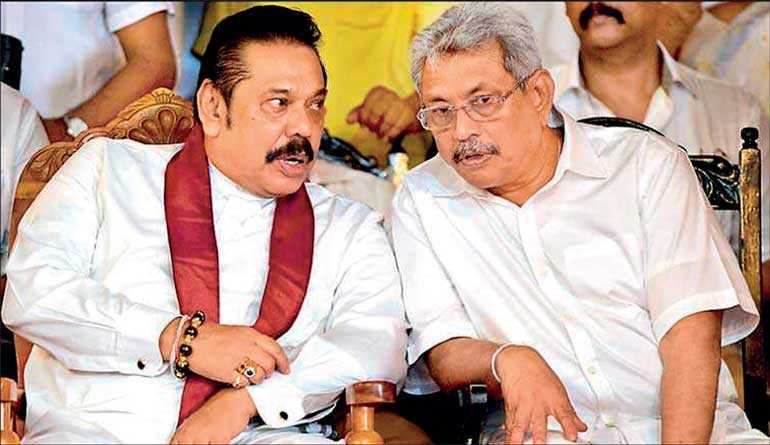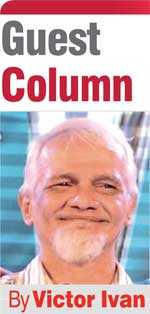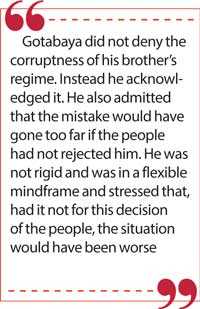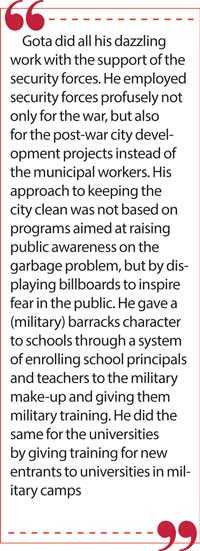Saturday Feb 21, 2026
Saturday Feb 21, 2026
Friday, 1 November 2019 00:00 - - {{hitsCtrl.values.hits}}

Following the announcement of the results of the Presidential Election on 17 November, and the new president swearing in, the ugly political system that has prevailed so far will end up giving way to an  equally repulsive political system.
equally repulsive political system.
It is the old presidential system introduced by J.R. Jayewardene with all the powers concentrated in the presidency which could do anything other than making a woman a man that will cease to operate. Thereafter, the 19th Amendment will come to effect in full swing. Consequently, the Parliament which had become exceedingly rotten under the presidential system and the parliamentary system of government associated with it will become the sole authority that handles and implement all the policies of the State.
The next president elected is only a nominal head. Yet he is elected in the same manner as the president who had the sole power of the State was selected i.e. by a Presidential Election held, treating the entire country as one single constituency. Normally, the president without executive powers is not elected like that. Often they are elected by the vote of a small authoritative committee appointed for the purpose. Despite the president elected being only a nominal head, there is a risk involved in his attempting to gain power over the law on account of the way he is elected. If that happens, there is a possibility of the entire system of governance becoming a mess and a hilarious farce.
Not only the ruling party but the entire Parliament is responsible for this desperate situation. At the same time, the Attorney General and the Judiciary are also responsible. All of them have acted as direct or indirect participants in this distortion. This situation clearly illustrates the level of bankruptcy of the institutional system of the country, which is responsible for the enactment of legislation and its review.
The question of Gotabaya
If Gotabaya Rajapaksa wins, undoubtedly it will intensify the contradiction and the distortion of the system of governance manifold. If that happens, the name of Gotabaya Rajapaksa will go down the annals of history as the first head of state in the world to have been elected by public vote despite having several indictments against him. 
An indictment is not a general charge sheet. It is a kind of a serious charge sheet issued by a higher Court, not by a lower Court, based on the observations of an investigation conducted by an authorised authority which had received the approval of the Attorney General as well. The issue surrounding Gotabaya’s citizenship and that of his passport and the identity card associated with it, still remains an unresolved puzzle.
The quantum of unresolved problems in regard to Gotabaya Rajapaksa will not end there. The documents related to his passport were not available in the Department of Immigration and Emigration. Similarly the documents related to his National Identity was not available in the Department for Registration of Persons. On the issue involving the purchase of MIG aircraft, he had testified to the Court on oath that it was a transaction between the two governments. However, subsequent investigations have revealed that it was not a deal between the two governments.
In this backdrop, inevitably the president of Sri Lanka will become a questionable person with unresolved problems. If he is an American citizen by law, it will be the first time an American citizen becomes the president of Sri Lanka. He’ll be a Sri Lankan president who has an American lady and an American child. If he comes to power, he will tend to use his authority to suppress all the accusations levelled against him, thereby paving the way for a complete collapse of the rule of law that has already been shattered to a great extent.
The civil mind of Mahinda
Although Mahinda Rajapaksa and Gotabaya Rajapaksa are two members of the same family, Mahinda had a civilian mind and not a military mind, despite serious limitations. But Gotabaya had a military mind, not a civilian mind.
I have already written about how the President Mahinda Rajapaksa was shocked in our presence when he heard about the abduction of Poddala Jayantha. His body language suggested that it had caused a great shock in him. He had, on several occasions acknowledged that things were happening in the country without his control.
Following the death of Lasantha Wickrematunge, the President telephoned and asked me, “Do you think I have anything to do with Lasantha’s incident?” I didn’t answer his question and remained silent, letting the President to proceed with the conversation. He explained to me the longstanding friendship he had with Lasantha Wickrematunge. I too, was aware of it. 
Prior to joining the UNP, Lasantha functioned as a secretary to Sirima Bandaranaike. Mahinda had a close friendship with Lasantha from that time on. During the regime of President Chandrika Kumaratunga, the friendship between the two grew steadily and it was through Mahinda that Lasantha learned about the all important issues discussed in Chandrika’s cabinet. President Chandrika Kumaratunga knew the close relationship between Lasantha and Mahinda. She was aware that the Cabinet secrets were sneaked to Lasantha by Mahinda. Consequently, Chandrika had nicknamed
Mahinda, ‘The Reporter’.
Although Mahinda Rajapaksa tried to make Lasantha a part of the government when he became the President in 2005, the latter decided to stay with the UNP which he was familiar with. Despite Lasantha having adopted a strong anti-government stand during the last phase of the war, he still continued to maintain a close personal relationship with President Mahinda Rajapaksa.
Kusal Perera
Kusal Perera was a close associate of Mahinda since the second JVP uprising. It was Kusal who organised the “Pada Yathrava” and “Janghoshava” programs initiated by Mahinda. However, after Mahinda came to power, Kusal did not become a supporter of Mahinda and instead he acted as a critic of Mahinda Rajapaksa regime.
Sivaram alias Taraki was abducted while he was having a discussion with Kusal. I was also there drinking beer with them about an hour before Sivaram was abducted. I left the place because I had other work to attend.
When the incidents of journalists being abducted, killed and assaulted continued, Mahinda had a fear that Kusal too, might fall victim, and I heard that Mahinda had made some arrangements with Harsha Navaratne to send Kusal for an employment in Nepal for a while. Perhaps Kusal may not have known that Mahinda had had a hand in this arrangement.
Following the victory of the internal war, I had a strong opinion that Sri Lanka would inevitably be plunged into an anarchic situation unless a series of structural reforms were introduced to restore and recreate the social system and the State which had become decrepit and degenerated. Several of us had two rounds of discussions about that with the TNA leaders as well, including Sambandan.
I wanted to explain to President Mahinda Rajapaksa the need for a structural reform program. After a series of attempts the President gave me an opportunity for a formal discussion on this issue. Minister Dullas Alahapperuma and Lalith Weeratunga, Secretary to the President, were also present at the discussion.
While I was explaining how the institutional system of Sri Lanka had collapsed, the President abruptly interrupted me remarking that it was not only the institutional system of the country that had collapsed; there were many things that were happening in the Temple Trees without my knowledge. Having said that, he proceeded to explain them. From his remarks, I was able to gather that despite President Mahinda Rajapaksa being a powerful ruler there had been many powerful factions within the government and many things had been going on under his name yet without his knowledge.
Gotabaya’s (military) barracks mind
Gotabaya had a barracks mind and not a civic mind. I have conducted two interviews with Gotabaya. Waruna Karunathilaka of Reuters News Agency also participated in both events. Both interviews were held not for the purpose of reporting in the media but for our information.
The first interview was held after the ending of the internal civil war. The second interview was held three or four days after the defeat of President Mahinda Rajapaksa at the Presidential Election in 2015. It was meant to find out the views of Gotabaya, the former Defence Secretary who is considered to be a key stakeholder in that regime, on the defeat of Mahinda Rajapaksa. The interview was held in his private home.
On an earlier occasion I had severely questioned and criticised him in front of the President and several newspaper editors in connection with his abusing Frederica Jansz, Editor of The Sunday Leader, in obscene language. Further, I had harshly criticised his involvement in an article under the caption ‘Gotabaya’s shadow,’ written after the anti-Muslim attacks at Aluthgama.
Gotabaya gave us the interview ignoring these incidents. I must say that Gotabaya expressed his views true to his conscience at the second interview. I asked him for his opinion about my observation that it was the rampant corruption of his brother and his rule that had caused the people to reject his rule. This can be considered the main issue among several questions that I posed to him. He did not deny the corruptness of his brother’s regime. Instead he acknowledged it. He also admitted that the mistake would have gone too far if the people had not rejected him. He was not rigid and was in a flexible mindframe and stressed that, had it not for this decision of the people, the situation would have been worse.
Gota did all his dazzling work with the support of the security forces. He employed security forces profusely not only for the war, but also for the post-war city development projects instead of the municipal workers. He followed an arbitrary policy in acquiring land occupied by slum dwellers for development of Colombo city. The slum dwellers were evacuated forcibly using military force and not by educating and obtaining the consent of the people.
His approach to keeping the city clean was not based on programs aimed at raising public awareness on the garbage problem, but by displaying billboards to inspire fear in the public. He gave a (military) barracks character to schools through a system of enrolling school principals and teachers to the military make-up and giving them military training. He did the same for the universities by giving training for new entrants to universities in military camps.
What Gotabaya means by discipline is the type of military discipline and not civilian discipline. Military discipline is imposed from outside and operates on orders and regulations while civil discipline can be regarded as a discipline based on self-restraint and respect for the rights of others in addition to their own rights.
Gotabaya is an ideal person to hold positions of security forces, but he cannot be considered qualified to be in charge of the governance of the country until he develops a civilian mind frame. If it was not for the unnecessary problems that he created for the Muslim community, Mahinda would have had more space to win the Presidential Election 2015. He had a better chance to win than being defeated. In that sense, Gotabaya can be considered the main person behind the defeat of Mahinda Rajapaksa.
After the Presidential Election
Whoever wins the Presidential Election, it will not help solve the country’s crisis. The country is in a situation where it cannot move a step forward without introducing structural changes required for integrating the society and rebuilding the nation which stands divided on the basis of race, caste and creed and recreating the State which is rampant with corruption and inefficiency.
The Constitution of the country lacks the proper order and the consistency that a constitution ought to have due to desecration of its sacred character by the rulers who came to power from time and also by the Judiciary. It has now become like a rag of a constitution of no use. No government can move forward effectively with the present Constitution.
Constitution making devoid of structural reforms is also ineffective in creating the modern nation and the modern State. Though the Parliament has a great power, it is in a rotten state. Such a Parliament cannot be expected to make a Constitution capable of making a profound change in the system. The best example of this is the Constitution that the Yahapalana Government attempted to create but failed to complete.
Constitution making
Parliament is in a failing state and there is extreme corruption. Parliamentarians have become businessmen engaged in business with the Government contrary to the law which can be considered the main cause of failure and the corruption of Parliament. The constitutional vision of the Yahapalana Government did not include necessary reforms required to make a profound change in this situation.
Further, in addition to the right to vote in elections, there was no provision to allow the public to actively participate in the governance process. The cost incurred in the compilation of the unfinished constitution is shockingly high. It was Rs. 13,600 million or $ 75.13 million. In South Africa, the constitution making was not limited to the Parliament. It was a people’s participatory constitution. The cost incurred was $ 30 million or Rs. 5,430 million. The constitution of Uganda was also a people’s participatory constitution and was not limited to Parliament. The cost incurred had been $ 20 million or Rs. 3,620 million. Eritrea is also a country that had adopted a participatory constitution spending only $ 4.5 million or Rs. 814.5 million. In view of the cost incurred by other countries listed above, Sri Lanka appears to have incurred an unbelievably high cost for its failed attempt to create an outdated constitution.
If Sri Lanka wants to make a constitutional change that will bring about a profound change in the whole system, that is, nation-building and the recreation of the State, it should deviate from the outdated model of restricting it to the Parliament and adopt the people’s participatory model which gives more power to the representatives of people’s organisations.
The educated citizens should endeavour to make this Presidential Election an opportunity to educate the public and influence the party leaders on the urgent need for having a people’s participatory constitution for Sri Lanka. There is no better or realistic way to choose to make a profound change in the system.